Interview with Former Dean Robert Rasmussen of the University of Southern California Gould School of Law
Published September 2009, last updated October 2009
Top-law-schools.com would like to thank Dean Robert Rasmussen for answering questions regarding the University of Southern California Gould School of Law.
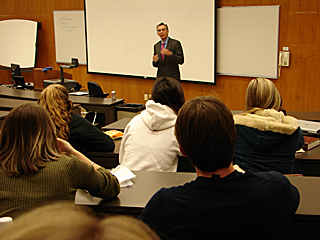 TLS: How would you describe the ideal candidate for University of Southern California (USC) Gould School of Law?
TLS: How would you describe the ideal candidate for University of Southern California (USC) Gould School of Law?
At USC, we enroll students from a variety of backgrounds who are united by their intelligence and passion. We look for a broad range of students who will bring very different life experiences to our intellectual community. Each of them, however, has excelled in prior endeavors and has all the indicators of future success expected at a top law school. In addition, each has a passion. Some want to use their legal training to change the world; others want the benefits of a USC education to develop a meaningful and rewarding career. Their commitments are as varied as they are and they share an understanding that USC Law will help them to achieve their goals.
TLS: Do you have any advice for students preparing to apply to law school? What about for admitted students to prepare for their first year at USC Law?
In applying to law school, the cardinal rule is to be yourself. Our admissions committee examines the entire file of the applicant. Not surprisingly, performance in college and the LSAT are given significant weight. The committee, however, does not rely on these metrics alone. It is important to us that we have a class that brings a variety of perspectives to the classroom. Because law is the vehicle through which society governs itself, we want all our law students to gain exposure to the ways in which law affects people and to learn to communicate with people of different perspectives. We therefore take pride in building a student body as diverse, complex and interesting as our city and our country.
In terms of preparation, the best advice is to come here ready to commit yourself fully to your law school education. The first year at USC is an exhilarating and demanding experience. You will be tested and pushed by your faculty and your peers in new and interesting ways. Those who thrive are those who are willing to invest themselves in their education.
TLS: What do you consider the most important factors an admitted applicant should examine when choosing which law school to attend?
The feel and texture of a law school are shaped by a number of factors. The reputation of the faculty and the quality of the students are obvious factors that all aspiring law students consider. There are other factors, however, that should enter the calculus. One is the location of the school. Even for the most national of law schools, location matters, for a couple of reasons. First, schools in major legal markets can augment their curricular offerings with some of the world’s best legal talent by bringing successful attorneys into the classroom as adjunct professors to help students understand the connection between theory and practice. Law schools are working to minimize the gap between law school and practice, and the schools that draw on a talented pool of practicing attorneys will be better able to ensure that students receive a well-rounded training that prepares them for the transition to the practice of law. Moreover, in this time of economic uncertainty, being located in a major legal market will increase your options for employment during and after law school. Finally, you will devote three years of your life to law school. If you enjoy the city you are in, you will have a more positive attitude, which will enhance your law school experience.
The size of the school is another variable to consider carefully. Large schools and small schools have different feels to them. I have taught at both a large law school (Michigan) and smaller ones (USC, Chicago and Vanderbilt). Students at small law schools tend to know almost everyone in their class. This common connection supports an ethos of collegiality and cooperation rather than competition. Not only does this make for a healthier learning environment, but it also provides a lesson in teamwork, which is an essential and too often overlooked skill of a successful lawyer. Moreover, small law schools make it easier for students to form professional relationships with their professors. Such a relationship both enriches a student’s education and provides a foundation for meaningful faculty career advice and references for the student seeking employment later.
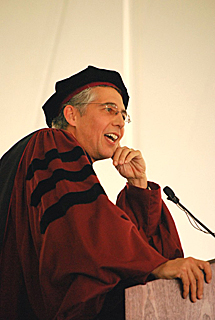 You should also try to get a sense of the alumni of the school. To the extent that alums have been successful (and happy), this suggests that the school is doing something right. Also, in addition to choosing a school, you are choosing which alumni network to join. Alumni can be a great asset at every stage of your career. They can serve as the crucial link in getting your first job, be mentors while you are developing as a new attorney, and serve as a source of business later in your career. You are at law school for three years, but you are an alum of that school for your entire career.
You should also try to get a sense of the alumni of the school. To the extent that alums have been successful (and happy), this suggests that the school is doing something right. Also, in addition to choosing a school, you are choosing which alumni network to join. Alumni can be a great asset at every stage of your career. They can serve as the crucial link in getting your first job, be mentors while you are developing as a new attorney, and serve as a source of business later in your career. You are at law school for three years, but you are an alum of that school for your entire career.
TLS: Many applicants have the perception that USC and UCLA are virtually identical if they are seeking job placement in Los Angeles. What separates USC from UCLA in job placement and education?
The USC Law Network has an almost mythical status in the California legal community. Our alums are everywhere. This is true both in the large, national firms in Los Angeles, Orange County, San Diego and San Francisco, and in the mid-size and small firms that many our of graduates find attractive. There is no better entrée into legal practice in Southern California than a USC degree.
Moreover, we are a much smaller law school than UCLA. Our small size has many advantages, including less competition for interview slots during On Campus Interviews with employers, and more personalized attention from our Career Services Office.
TLS: What do you feel are some of the strongest programs within USC Law?
USC has long been known for fostering a climate of interdisciplinary studies. The school realized long ago that the best lawyers draw on the insights from a variety of disciplines such as economics, history, philosophy and psychology. Moreover, the fact that we are located within walking distance of USC’s other professional and graduate schools allows our students to enhance their education by learning with students from those other schools. The students at USC’s other professional schools are going to be leaders in their fields, and our proximity allows our students to start building a professional network that will support them throughout their careers.
In terms of doctrinal areas of strength, our faculty includes experts from a broad range of fields. These include business law, constitutional law, intellectual property, real estate law and tax law. In each of these areas, the faculty provide students with both a theoretical grounding and a sense of how these theories cash out in practice. For example, our tax faculty includes those with advanced training in economics, as well as a colleague with thirty years of tax practice experience at a major New York law firm.
Another strength of USC Law is the variety of clinical programs we offer. Our clinics allow students to work with real clients, but each focuses on a different practice setting. Our Post-Conviction Clinic is a traditional litigation-based clinic that allows students to get advanced training in litigation, participating in various types of hearings and trials. Our Small Business Clinic allows students to hone their transactional skills, learning first-hand about establishing corporations, drafting contracts, and dealing with the basic legal work needed by corporations. The Employment Law Clinic works with employers to adopt appropriate employment policies, which allows students to experience client counseling first hand. Our Immigration Law Clinic introduces students to the practice of administrative law and allows our students to assist in representing people before immigration tribunals with a variety of legal issues at stake. Our Mediation Clinic exposes students to the growing domain of alternative dispute resolution, the practice of avoiding the courtroom by a structured process of negotiation; finally, our Intellectual Property clinic provides students the opportunity to craft licensing agreements, such as those common in the entertainment industry, as well as engaging in policy debates involving the rapidly evolving law of copyright and patent.
Finally, we are in the process of putting together integrated courses of study for those interested in business law and those interested in entertainment law. We are still working out the details, but these programs will be fully up and running in the Fall 2010 semester.
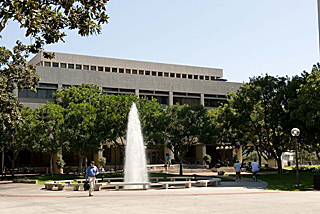 TLS: This month marks your second anniversary as dean of the law school at USC. What changes have you made of which you are particularly proud? What changes do you hope to make during the rest of your time as dean?
TLS: This month marks your second anniversary as dean of the law school at USC. What changes have you made of which you are particularly proud? What changes do you hope to make during the rest of your time as dean?
USC has been a leading law school for decades, and I continue to be impressed by the traditions of excellence and diversity that have been at our core since well before I came here. My focus since I arrived has been to build on the existing strengths of what already is one of the country’s best law schools. To this end, we have increased the faculty by a net of nine over the last two years, adding both junior and senior faculty. On the curricular front, we are establishing a Tax LLM program to take advantage of our strength in tax, in addition to our law and business and law and entertainment initiatives.
TLS: Will the recent economic downturn greatly impact your goals?
We have taken advantage of the current economic climate as an opportunity to examine all our programs and ensure that we are using our resources wisely. It is imperative that the new economic reality does not impair our educational goals; if anything, the changes that we are seeing in the legal profession have added new impetus to our commitment to give students the kind of education that best prepares them to have meaningful legal careers. Of course we are mindful of these leaner times, but as part of a leading private research university, we are well situated to continue our operations without disruption to our teaching mission.
TLS: What are your thoughts on the U.S. News Law School Rankings?
The rankings are a fact of life. Rather than ponder what the world would look like without rankings, or ways in which the rankings present an “unfair” view of one school or another, it is better to make sure that you communicate to students what makes you distinct. Our students are smart enough to do their homework, and to know that rankings are only a very blunt approximation of quality. We know they will recognize our strengths as long as we give them the accurate information they need. We are proud to be among the most highly ranked law schools in the country, but we are equally proud to offer our own distinct version of the highest-quality legal education. When students learn about our outstanding faculty, our great location, and the extraordinarily supportive, collaborative, passionate, and diverse nature of our community, I am confident we will continue to attract some of the best and brightest students in the country.
TLS: UC-Irvine will open their law school doors this month. Though they are still pending ABA accreditation, many expect they will be a Tier 1 law school when they do receive accreditation. Dean Chemerinsky has openly stated the school’s goal is to be in the US News Law School Rankings Top 20 schools. As the dean of USC, do you worry about oversaturation occurring, making it more difficult for USC graduates to secure jobs?
With our strong and deep alumni network, the quality of our students and the quality of our education, there will always be a strong demand for USC law students. This is especially true given our relatively small size. Even in the current economic environment, our students are better positioned than most to begin their legal careers. We have alumni in senior level positions at many employers who are strong and effective advocates for recruiting at USC. I have respect for Dean Chemerinsky and I hope that he is able to accomplish his goals. But there is one thing he can never give his students—a USC education.
TLS: USC Law and Northwestern are the only Top 20 schools that are also ranked in the US News Diversity Index’s Top 10. What benefits does USC Law’s diversity provide to all of its students?
Our diversity increases the quality of all of our students’ education and prepares them well for the future. The mix of students from many different backgrounds means that there is no real majority culture at USC. We are a community comprised of people from many differing backgrounds. This has a direct impact on the quality of the education that all of our students receive. In law school, the input of students has an effect both on the classroom discussion and on the discussions that occur among students in the hallways.
Since much of the law is interpretation, understanding a problem from a perspective other than your own allows you to have a richer understanding of the nuances of the problem. This includes race, gender, financial disadvantages, sexual orientation and ethnicity, but it also extends to political perspective, intellectual methodology, age, disability, military service, interactions with law enforcement, religion, etc. For example, the law requires an employer or other facility to provide a “reasonable accommodation” under the Americans with Disabilities Act. If you have a disability or have a family member with a disability, might that affect your view of what is reasonable? What is probable cause for an arrest? If you have been a police officer you may have one view; if you have been arrested, you may have another view. In short, it helps us learn specifically how the law affects different people in different ways. We do ourselves a disservice if we allow ourselves to learn only with people just like us. An effective legal education depends in large part on the opening of minds, and diversity contributes to that.
Moreover, lawyers must be able to communicate effectively with different populations (clients, juries, other lawyers, judges). Exposure to people with different backgrounds—and learning how to communicate with them effectively—makes for a more successful lawyer. In short, one is better prepared for a variety of leadership roles.
TLS: Some applicants who are not classified as under-represented minorities (URMs) are often perplexed on what they should write a diversity statement about. Since USC has a heavily-emphasized diversity statement, what insights can you provide to these applicants and can you provide a few examples of strong diversity statements?
Diversity encompasses many facets. We are looking for differing perspectives, a willingness to share, and a willingness to learn. As I mentioned above, the key here is to be yourself and articulate the ways in which your own experiences will shape your understanding of the law. Think about what your own unique contribution to your law school class might be.
TLS: How does Law Review and other journal selection work at your law school?
All students wishing to serve on one of our journals have to participate in the writing competition. In terms of selection, some end up on a journal based solely on their grades, others based solely on their writing, and the rest on a combination of the two.
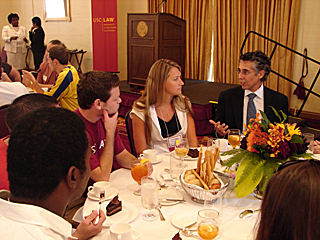 TLS: What do you think students enjoy most about USC Law? Can you describe the student culture at USC Law?
TLS: What do you think students enjoy most about USC Law? Can you describe the student culture at USC Law?
Students obviously enjoy our location in Southern California in general and in downtown Los Angeles in particular. Los Angeles is one of the world’s great cities, and we are minutes from venues such as the Staples Center, the Getty Center, LA Live and Disney Hall.
As part of the University of Southern California, USC Law offers all the advantages and resources of a major research university. But USC Law itself is small and intimate: students have immediate and easy access to professors, administrators know students by name, and the friendly atmosphere extends from faculty to staff to students. Collegiality, rather than competition, is the defining characteristic of our community. Our students have a very popular public interest program in which many students participate in volunteer opportunities for law students. They also have a healthy, fun-loving spirit that brings them together for social activities.
TLS: How is the law school adapting to the changing legal market? Will there be any changes to the OCI process or career services?
We are committed to ensuring that USC Law students retain the attractive job options they have typically enjoyed. This year the Career Services Office will be more flexible in accommodating employers outside of the scheduled OCI programs. Since several large firms are still finalizing their hiring plans we need to adapt to their needs.
The CSO has been actively identifying smaller and mid-sized firms in the region. We are in the fourth year of producing a comprehensive job search guide for the small firm job search and have increased the size of our small firm directory to include 700+ firms and contact information for 700+ USC Law alumni working at these firms.
This year the CSO has introduced an Intensive Career Management Program (ICMP), which will provide students with the opportunity to work closely with a career counselor in the CSO in a more structured manner than they would in the traditional career counseling model. Students who participate in the ICMP will be held accountable for completing tasks and assignments related to their job search throughout the year. An assigned CSO career counselor will check in regularly with students via email and monthly career counseling sessions. The goal of the program is to motivate students to develop a more active job search strategy (i.e., defining career goals, networking, developing an alumni mentor relationship, improving resume writing/cover letter writing skills and interviewing skills) as opposed to the popular passive job search strategy (e.g., OCI, job postings).
The law school is also hosting a discussion series this fall which will bring in experts in the legal field to discuss the changing dynamics in the large law firm model.
TLS: What do students typically do during their 1L and 2L summers?
During the summer after the first year, students work in a number of different settings including judicial chambers, in the law school as research assistants, in public interest organizations, in law firms of varying sizes, in in-house legal departments and in the government.
In the second year, there is a dramatic shift with the large majority of our students working in law firms.
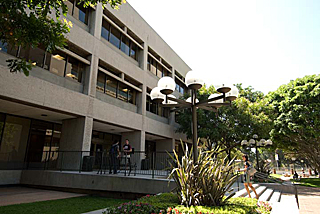 TLS: What would you say to an applicant who is concerned he or she could not secure strong employment outside of California if he or she attends USC?
TLS: What would you say to an applicant who is concerned he or she could not secure strong employment outside of California if he or she attends USC?
Our alumni hold leadership positions in major firms across the country. If anything, the problem is not that law firms don’t want USC students; rather, the problem is that students who spend three years at USC fall in love with Southern California and decide not to pursue opportunities elsewhere.
Our Career Services Office works closely with students interested in working outside of California to develop an effective job search strategy to maximize the resources available to our students. As one example, in conjunction with four other law schools, we co-host off-campus interview programs in New York and Washington DC in August.
TLS: Can you offer any general advice to TLS members on succeeding in the law school application process, while in law school, and in their legal careers?
Law school is a professional school. It requires an investment of money and of your most valuable asset, your time. You should approach the process of finding the right law school as a decision where you are going to invest the next three years of your life. You will reap the returns on this investment for the rest of your life. Focus on locating the school that is going to provide the best experience and training.
Interview with Edward Tom, Former Dean of Admissions U.C. Berkeley Boalt Hall School
Interview with Richard Geiger, Former Associate Dean and Dean of Admissions for Cornell Law School
Interview with Former Dean David E. Van Zandt of Northwestern University School of Law
Interview with Former Dean Robert Berring of Boalt Hall
Interview with Former Dean Sarah Zearfoss University of Michigan Law School
Interview with Professor Brian Leiter
Interview with Former Dean Victoria Ortiz UC Irvine School of Law
Interview with Former Dean Donald Polden of Santa Clara
Interview with Former Dean Jeanette Leach of Admissions to Santa Clara University's School of Law
Interview with Santa Clara Law School Former Assistant Dean Alexandra Horne
Interview with Former Dean Hasl of Thomas Jefferson School of Law
Interview with Joan Howland, Former Associate Dean at the University of Minnesota
Interview with Former Dean Evan Caminker of University of Michigan Law School
Interview with Former Dean Erwin Chemerinsky UC Irvine School of Law
Interview with Former Dean Jason Trujillo of UVA Law
Interview with Former Dean Stewart Schwab of Cornell Law School
Interview with Ann Perry of The University of Chicago Law School
Interview with Johann Lee at Northwestern University Law School
Interview with Kevin Johnson UC Davis Law
Interview with Former Dean Robert Rasmussen of USC Law
Interview with Dr. Karen Reagan Britton, UT Law
Interview with Dean Doug Blaze, UT Law
Interview with Jannell Roberts, Former Associate Dean of Admissions at Loyola Law
Interview with Susan L. Krinsky, Former Associate Dean of Admissions at Tulane Law
Interview with Faye Shealy, Former Associate Dean of Admissions at William & Mary Law School
Interview with Robert H. Jerry, II, Former Dean & Levin Mabie and Levin Professor of Law
Interview with Former Dean Earl Martin of Gonzaga Law
Interview with Stephen Brown, Associate Dean of Admissions at the Fordham University School of Law
Interview with Jacqlene Nance, Former Director of Admissions at the University of Kansas School of Law
Interview with Former Dean Robert Schwartz at UCLA School of Law
Interview with Matthew Diller, Former Dean and Professor of Law at Benjamin N. Cardozo School of Law
Interview with Andy Cornblatt, Dean of Admissions at Georgetown University Law Center (GULC)
Interview with Chris Guthrie, Dean of the Vanderbilt University Law School
Interview with G. Todd Morton, Assistant Dean and Dean of Admissions for Vanderbilt University Law School
Interview with Susan Lee, Former Director of Admissions at Gonzaga University School of Law
Interview with Arizona State University Sandra Day O’Connor College of Law Former Dean and Foundation Professor of Law – Paul Schiff Berman
Interview with Alissa Leonard, Director of Admissions and Financial Aid at the Boston University School of Law
Interview with David Partlett, Former Dean of Emory University School of Law
Interview with Michelle Rahman, Former Associate Dean for Admissions at the University of Richmond School of Law
Interview with Isabel DiSciullo, Former Assistant Dean of Admissions for Drexel Law
Published July 2010 Introduction Top-Law-Schools.com would like to thank Asha Rangappa, Associate Dean for Admissions at Yale Law School, for taking the time to answer our questions! TLS: Since becoming Associate Dean in 2007, you have reached out to th
Interview with Josh Rubenstein, Former Assistant Dean for Admissions at Harvard Law School
Interview with Renee C. Post at the University of Pennsylvania School of Law
Interview with Former Dean Rita C. Jones of Boston College Law School
Interview with S. Brett Twitty, Former Director of Admissions, W&L Law
Interview with Lillie V. Wiley-Upshaw, Vice Dean for Admissions and Financial Aid, University at Buffalo Law School
Interview with Nikki Laubenstein, Director of Admissions at Syracuse University College of Law
Interview with Janet Laybold, Former Associate Dean, Admissions, Career and Student Services, Washington University School of Law
Interview with Anthony Crowell, Former Dean of New York Law School
Interview with Jessica Berg and Michael Scharf, Former Co-Deans of Case Western Reserve University School of Law
Interview with Alyson Suter Alber, Associate Dean for Enrollment Planning and Strategic Initiatives, Case Western Reserve University School of Law
Interview with Jeffrey A. Dodge, Former Associate Dean of Students, Academic Affairs & Administration, University of Idaho College of Law
Interview with L. Pilar Mensah, Assistant Dean for Admissions; Sondra R. Tennessee, Associate Dean for Student Affairs; and Tiffany J. Tucker, Assistant Dean for Career Development, University of Houston Law Center
Interview with Jay L. Austin, Former Assistant Dean, Admissions and Student Financial Services, UC Irvine School of Law
Interview with Mathiew Le, Former Assistant Dean of Admissions & Financial Aid, University of Washington School of Law
Interview with Daniel M. Filler, Dean and Professor of Law, Drexel University, Thomas R. Kline School of Law
Interview with Donald Tobin, Dean and Professor of Law, the University of Maryland Francis King Carey School of Law
Interview with Amy Mangione, Assistant Dean and Director of Admissions, Albany Law School
Interview with Christopher J. Peters, Former Dean and Professor of Law, The University of Akron School of Law
Interview with Carla Pratt, Dean and Professor of Law, Washburn University School of Law
Interview with Michelle Rahman, Associate Dean for Admissions, the University of Richmond School of Law
Interview with Verna Williams, Interim Dean and Nippert Professor of Law, the University of Cincinnati College of Law
Interview with Allen Rostron, Former Associate Dean for Students and the William R. Jacques Constitutional Law Scholar and Professor of Law, University of Missouri-Kansas City School of Law
Interview with Faye Shealy, Former Associate Dean for Admission, William & Mary Law School
